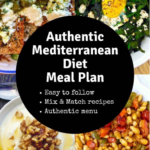Embracing the Mediterranean Diet Meal Plan: A Guide to Healthier Living
The Mediterranean Diet is celebrated globally for its healthful approach and delicious cuisine. Originating from countries around the Mediterranean Sea, this diet emphasizes the consumption of fruits and vegetables, whole grains, olive oil, and seafood. Acknowledged for its myriad health benefits, including heart health and weight management, the Mediterranean Diet is not just a dietary plan but a lifestyle.
Understanding the Mediterranean Diet
Health Benefits
- Heart Health: The diet’s focus on healthy fats and fiber-rich foods contributes to reduced heart disease risks.
- Weight Management: Emphasizing plant-based foods and lean proteins helps maintain a healthy weight.
Key Components
- Fruits and Vegetables: Essential for daily meals, providing vitamins and minerals.
- Whole Grains: Options like bulgur and farro offer fiber and essential nutrients.
- Olive Oil: A cornerstone for healthy fats in the diet.
- Seafood: Especially rich in omega-3 fatty acids.
For more detailed nutritional information, Harvard Health Publishing offers an excellent resource.
Crafting Your Mediterranean Diet Meal Plan
Starting Tips
- Personalization: Adapt the diet to fit your taste preferences and dietary requirements.
- Balance: Incorporate various foods for a well-rounded nutritional intake.
Sample Meal Plan
- Breakfast: Greek yogurt with homemade granola.
- Lunch: Greek salmon salad.
- Dinner: Ribollita (Tuscan white bean soup).
The American Heart Association provides valuable guidelines for transitioning to this diet.
Shopping List Essentials
- Key items include olive oil, legumes, fresh produce, and whole grains.
FAQs
Common Questions
- Is the Mediterranean diet adaptable for everyone? Yes, it suits various dietary needs with appropriate modifications.
- Can vegetarians or vegans follow this diet? Absolutely, it’s highly flexible for plant-based adaptations.
Conclusion
The Mediterranean diet offers a harmonious blend of nutritious and flavorful food choices. Adopting this diet can lead to a healthier, more balanced lifestyle, replete with the joys of Mediterranean culinary traditions. For
Embracing the Mediterranean Diet Meal Plan: A Path to Healthier Eating
The Mediterranean Diet, renowned for its health benefits, stems from the eating habits of the Mediterranean Sea bordering countries. It emphasizes the consumption of fruits and vegetables, whole grains, olive oil, and seafood, making it a nutrient-rich and balanced dietary choice.
Understanding the Mediterranean Diet
Health Benefits
- Heart Health: Its focus on healthy fats and high fiber foods can reduce the risk of heart disease.
- Weight Management: Prioritizing plant-based foods and lean proteins aids in maintaining a healthy weight.
Key Components
- Fruits and Vegetables: A staple in every meal, providing essential vitamins and minerals.
- Whole Grains: Sources like bulgur and farro offer fiber and nutrients.
- Olive Oil: The primary source of healthy fats in the diet.
- Seafood: Especially rich in omega-3 fatty acids.
For a more in-depth understanding, Harvard Health Publishing provides valuable insights on the diet’s nutritional benefits. Read more here.
Creating Your Mediterranean Diet Meal Plan
Starting Tips
- Customization: Tailor the diet to suit your personal preferences and dietary needs.
- Variety: Incorporate a diverse range of foods for a balanced diet.
Sample Meal Plan
- Breakfast: Greek yogurt with homemade granola.
- Lunch: Greek salmon salad.
- Dinner: Ribollita (Tuscan white bean soup).
For practical tips on transitioning to this diet, the American Heart Association offers a comprehensive guide. [Check it out here](
Embracing the Mediterranean Diet Meal Plan: A Path to Healthier Eating
The Mediterranean Diet, renowned for its health benefits, stems from the eating habits of the Mediterranean Sea bordering countries. It emphasizes the consumption of fruits and vegetables, whole grains, olive oil, and seafood, making it a nutrient-rich and balanced dietary choice.
Understanding the Mediterranean Diet
Health Benefits
- Heart Health: Its focus on healthy fats and high fiber foods can reduce the risk of heart disease.
- Weight Management: Prioritizing plant-based foods and lean proteins aids in maintaining a healthy weight.
Key Components
- Fruits and Vegetables: A staple in every meal, providing essential vitamins and minerals.
- Whole Grains: Sources like bulgur and farro offer fiber and nutrients.
- Olive Oil: The primary source of healthy fats in the diet.
- Seafood: Especially rich in omega-3 fatty acids.
For a more in-depth understanding, Harvard Health Publishing provides valuable insights on the diet’s nutritional benefits. Read more here.
Creating Your Mediterranean Diet Meal Plan
Starting Tips
- Customization: Tailor the diet to suit your personal preferences and dietary needs.
- Variety: Incorporate a diverse range of foods for a balanced diet.
Sample Meal Plan
- Breakfast: Greek yogurt with homemade granola.
- Lunch: Greek salmon salad.
- Dinner: Ribollita (Tuscan white bean soup).
For practical tips on transitioning to this diet, the American Heart Association offers a comprehensive guide. Check it out here.
Shopping List Essentials
- Essentials like olive oil, legumes, fresh produce, and whole grains are key for Mediterranean meals.
FAQs
Common Questions
- Is the Mediterranean diet adaptable for everyone? Yes, it’s versatile and can be modified for various dietary preferences.
- Can vegetarians or vegans follow this diet? Definitely, it’s flexible enough to accommodate plant-based eating.
Conclusion
Adopting the Mediterranean diet means embracing a lifestyle that values nutritious, flavorful foods. It’s not just about the meals but also about adopting a healthier approach to eating and living, reflecting the rich culinary heritage of the Mediterranean region.

